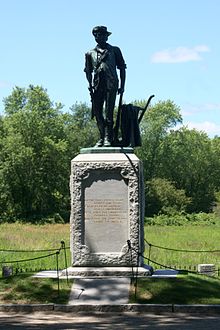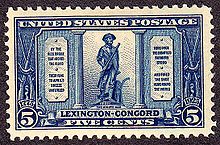- Concord Hymn
-
"Concord Hymn" is a poem by Ralph Waldo Emerson.
History
 The first stanza of "Concord Hymn" is inscribed at the base of The Minute Man statue by Daniel Chester French.
The first stanza of "Concord Hymn" is inscribed at the base of The Minute Man statue by Daniel Chester French.
 The poem's first stanza was also featured on a 1925 U.S. 5-cent stamp.
The poem's first stanza was also featured on a 1925 U.S. 5-cent stamp.
Emerson wrote "Concord Hymn" in 1836 for the dedication of the Obelisk, a battle monument in Concord, Massachusetts that commemorated the men that gave their lives at the Battle of Lexington and Concord (April 19, 1775), the first battle of the American Revolution.
One source of its power may be Emerson's personal ties to the subject. His grandfather fought in the Battle of Lexington and Concord. The family house, The Old Manse, is next to the bridge mentioned in the poem, and the author wrote the hymn while living there.
In 1837, the hymn was sung to the tune "Old Hundredth" during Concord's 4 July celebration.[citation needed] Modern critic Jonathan Mardin reflected on it favorably, calling it a "Too little-known masterpiece."
Poem
By the rude bridge that arched the flood,
Their flag to April’s breeze unfurled,
Here once the embattled farmers stood,
And fired the shot heard round the world.
The foe long since in silence slept;
Alike the conqueror silent sleeps;
And Time the ruined bridge has swept
Down the dark stream which seaward creeps.
On this green bank, by this soft stream,
We set to-day a votive stone;
That memory may their deed redeem,
When, like our sires, our sons are gone.
Spirit, that made those spirits dare,
To die, and leave their children free,
Bid Time and Nature gently spare
The shaft we raise to them and thee.(Note: This version is from The Complete Works of Ralph Waldo Emerson (1904), edited by Edward Waldo Emerson, who noted, "From a copy of this hymn as first printed on slips for distribution among the Concord people at the celebration of the completion of the monument on the battle-ground, I note the differences from the poem here given as finally revised by Mr. Emerson in the Selected Poems."
References
Categories:- 1836 poems
- 1837 songs
- American poems
- Concord, Massachusetts
- Poetry by Ralph Waldo Emerson
Wikimedia Foundation. 2010.
